This Transient Life Blu-ray Movie
HomeThis Transient Life Blu-ray Movie 
無常 / MujōArrow | 1970 | 143 min | Not rated | No Release Date
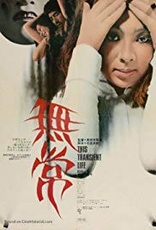
Price
Movie rating
6.8 | / 10 |
Blu-ray rating
| Users | 0.0 | |
| Reviewer | 4.0 | |
| Overall | 4.0 |
Overview
This Transient Life (1970)
Near a remote Buddhist monastery, a young man falls in love with his sister and gets her pregnant. After a monk finds out, the young man becomes an assistant to a master sculptor, only to proceed to complicate matters with his affairs.
Starring: Michiko Tsukasa, Ry˘ Tamura, Eiji Okada, Isao Sasaki, Mitsuko Tanaka (III)Director: Akio Jiss˘ji
| Foreign | Uncertain |
| Drama | Uncertain |
| Erotic | Uncertain |
Specifications
Video
Video codec: MPEG-4 AVC
Video resolution: 1080p
Aspect ratio: 1.37:1
Original aspect ratio: 1.33:1
Audio
Japanese: LPCM Mono
Subtitles
English
Discs
Blu-ray Disc
Single disc (1 BD)
Playback
Region A (B, C untested)
Review
Rating summary
| Movie | 4.0 | |
| Video | 4.0 | |
| Audio | 3.5 | |
| Extras | 1.5 | |
| Overall | 4.0 |
This Transient Life Blu-ray Movie Review
Reviewed by Jeffrey Kauffman August 18, 2019 Note: This film is available as part of
Akio Jissoji: The Buddhist Trilogy.
This provocative triptych by Akio Jiss˘ji may have attained the sobriquet The Buddhist Trilogy, but that may in turn beg the question of
whether Jiss˘ji might be subliminally proferring Heraclitus and/or the Marquis de Sade as proponents of the religion. Hercalitus famously
(supposedly) proclaimed that
itĺs impossible to step in the same river twice, giving philosophers a nice visual trope for the evanescence of life, something Japanese New Wave
expert David Desser, who is on hand here as a commentator, mentions is a key element of Jiss˘jiĺs work. But as Desser also gets into in one of his
introductions to the films which are
included as bonus features, thereĺs also a fairly kinky sex aspect to these films that some may feel arguably places them pretty squarely in what
Desser refers to
as the ôRoman pornoö genre. That may not mesh especially well with the vaunted Buddhist concept of non-attachment, since several
pairs of
lovers in these films are very attached to each other (so to speak), in sometimes shocking ways. The Buddhist Trilogy was
released courtesy of
the Art Theater Guild, a production house noted for its contributions to the Japanese New Wave, and as Desser also gets into, some of Jiss˘ji's
stylistic flourishes at least if not always all of his content "qualify" him for membership in that movement. One of the kind of funny things about
Jiss˘ji, though, is that for many
Western fans, and for fans of another kind of Japanese entertainment, he'll be forever celebrated as the creator of Ultraman, which in and of itself probably
speaks as well as anything to Jiss˘ji's versatility.
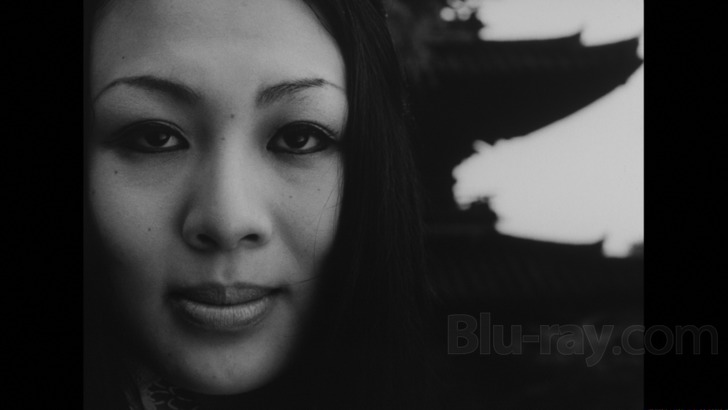
What might be termed the "Heraclitean" aspect of Jiss˘ji is on display in the very title of This Transient Life, and stylistically this film is a really interesting series of shots that track and dolly, as if the camera itself were part of some metamorphic essence permeating the storytelling. That said, the actual plot dynamics of this film are kind of on the tawdry, soap operatic side, though the visual element of this film is so strong that its tale of an incestuous relationship between a brother and sister, playing out against a background of Buddhist iconography, becomes perhaps more muted and weirdly "acceptable" (though obviously still shocking). A lot of the framings in this film, at least the ones not affected by artifices like fish eye lenses, actually strangely reminded me of Ingmar Bergman, probably at least due in part to the ravishing black and white cinematography of Yuzo Inagaki, Masao Nakabori and Kazumi Oneda.
This Transient Life Blu-ray Movie, Video Quality 
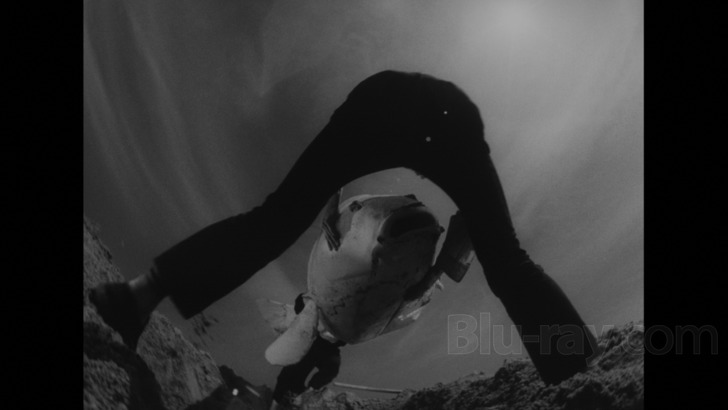
This Transient Life is presented on Blu-ray courtesy of Arrow Academy with an AVC encoded 1080p transfer in 1.37:1. Arrow really hasn't provided my technical information on the transfer, other than some generic verbiage that masters were provided by Toho and that addtional grading work was done by R3Store. This is a ravishing looking film courtesy of the aforementioned stunning black and white cinematography, and it's offered here in a generally great looking transfer. The entire presentation looked just a tad dark to my eyes, something which perhaps tends to emphasize a somewhat gritty looking grain field at times, but Jiss˘ji's frequent use of extreme close-ups really elevates fine detail levels throughout the film. On the flip side, a lot of dark material has passing crush and a lack of shadow definition at times. There is some minor frame instability, with noticeable wobble during the credits, as well as very minor but observable flicker that tends to be most noticeable in the few moments when the camera is a bit more static. There is some passing and minor damage, along with a couple of moments that are more significantly scratched.
This Transient Life Blu-ray Movie, Audio Quality 
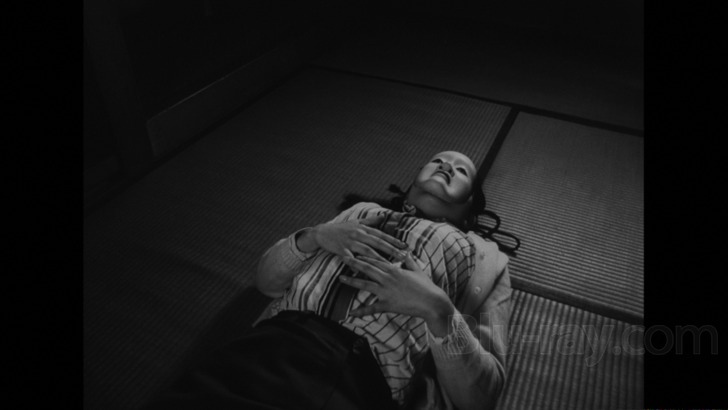
This Transient Life features an LPCM Mono track in the original Japanese. There are a couple of pops and cracks along the way (including a rather loud set of pops at the film's opening), but for the most part everything here is rendered without any major problems. As in several of Jiss˘ji's films, the score is actually western in flavor, and some of the harpsichord and string cues can sound just a trifle brittle in the upper registers. Dialogue is presented cleanly and clearly throughout.
This Transient Life Blu-ray Movie, Special Features and Extras 
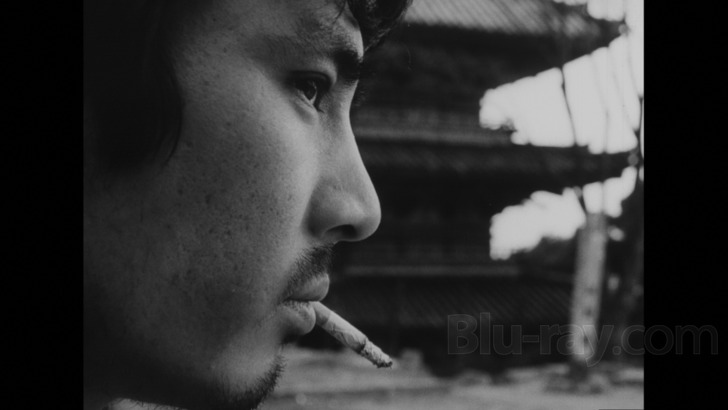
All three of the films in this set feature audio introductions (that play like commentaries to scenes from the film) and selected scene commentaries by David Desser. Kind of oddly, the selected scene commentaries have all been authored separately and there's no Play All option.
- Introduction by David Desser (1080p; 10:17)
- Selected Scene Commentaries feature 15 scenes.
This Transient Life Blu-ray Movie, Overall Score and Recommendation 
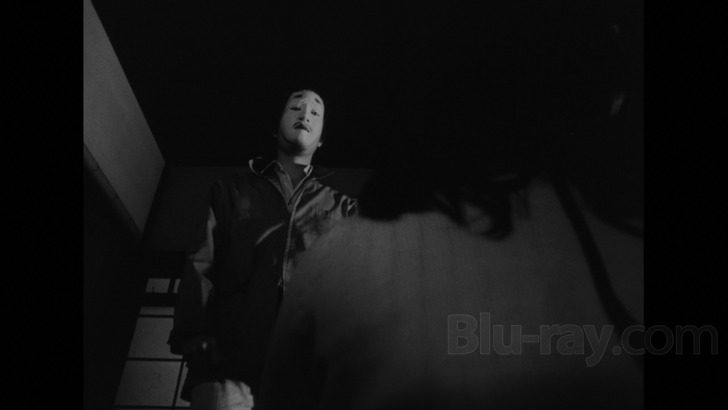
As with the other films in this set, and perhaps arguably even more so, style may actually help to soften some of the substance in this film. This is one of the most arresting visual experiences in Jiss˘ji's career, and for the most part it looks and sounds fine in this presentation from Arrow Academy. Recommended.
Similar titles
Similar titles you might also like
(Still not reliable for this title)

Mandala
Mandara / 曼陀羅
1971

Poem
Uta / 哥
1972

Heroic Purgatory
煉獄エロイカ
1970

Eros + Massacre
エロス+虐殺
1969

Coup dĺÚtat
戒厳令
1973

It Was a Faint Dream
あさき夢みし / Asaki yumemishi / Life of a Court Lady
1974

L' Immortelle
The Immortal One
1963

Story of Sin
Dzieje grzechu
1975

Her Body
JejÝ telo
2023

The Ballad of Narayama
Narayama bushik˘
1983

Funeral Parade of Roses
薔薇の葬列
1969

Maborosi
幻の光 / Maboroshi no hikari
1995

Gate of Flesh
肉体の門 / Nikutai no mon
1964

Appassionata
Limited Edition to 3000
1974

Julia
Es war nicht die Nachtigall
1974

An Actor's Revenge
雪之丞変化 / Yukinoj˘ henge
1963

Tokyo Decadence
トパーズ / TopÔzu
1992

The Key 4K
La Chiave
1983

Sex and Zen
Yuk po tuen: Tau ching bo gam / Y¨ p˙ tußn zhī tōu qÝng bǎo jiÓn / 玉蒲團之偷情寶鑑
1991

Sister Emanuelle
Suor Emanuelle
1977